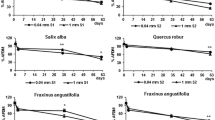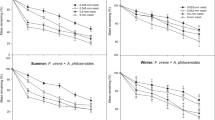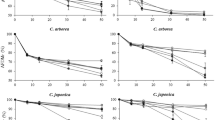Abstract
Decomposition of Spartina anglica, Elytrigia pungens and Halimione portulacoides was studied for 20.5 months in situ in two habitats on a salt marsh in The SW Netherlands. Litter bags of three different mesh sizes were used to exclude meio- and/or macrofauna. The middle-marsh habitat was flooded more frequently than the plant-debris habitat in the highest marsh zone. Decomposition of the three species followed an exponential pattern of decay: instantaneous decay rates varied from 0.0026 to 0.0054 per day. Decay rates were significantly influenced by habitat factors and fauna, while there was a significant interaction between plant species and habitat. In case of a significant meio- and/or macrofauna effect, this became noticeable 12–16 weeks after the start of decomposition and resulted in a difference of 5–10% ash-free dry weight remaining after 20.5 months. Nematodes were the dominant microfaunal group in the plant litter. Densities were influenced by habitat conditions but not by resource quality, season and meio- and/or macrofauna. Only initial C/N and C/P ratios were correlated with differences in decomposition rates between the plant species. During the later stages of decomposition N and P concentrations of the plant litter were higher in the plant-debris habitat than in the middle-marsh habitat, probably as a result of fluctuating detritivores densities. The course of the decomposition process differed per plant species and per habitat. The results of this study underline the importance of knowledge of long-term decomposition rates.
Similar content being viewed by others
References
Allen, S.E., 1974. Chemical Analysis of Ecological Materials. Blackwell, Oxford.
Bouwman, L. A., Romeyn, K., Kremer, D. R. & Es, F. B. van. Occurrence and feeding biology of some nematode species in Aufwuchs communities. Oecologia (in press).
Breteler, R. J. & Teal, J. M., 1981. Trace element enrichments in decomposing litter of Spartina alterniflora. Aquat. Bot. 11: 111–120.
Chapman, V. J., 1974. Salt Marshes and Salt Deserts of the World, 2nd ed. J. Cramer, Bremerhaven.
Christian, R. R. & Wetzel, R. L., 1978. Interaction between substrate, microbes and consumers of Spartina detritus in estuaries. In: M. L. Wiley (ed.), Estuarine Interactions, pp. 93–114. Acad. Press, New York.
Coull, B. C. & Bell, S. S., 1979. Perspectives of marine meiofaunal ecology. In: R. J. Livingston (ed.), Ecological Processes in Coastal and Marine Systems, pp. 189–216. Plenum Press, New York.
Cruz, A. A. de la, 1975. Proximate nutritive value changes during decomposition of salt marsh plants. Hydrobiologia 47: 475–480.
Dame, R.F., 1982. The flux of floating macrodetritus in the North Inlet estuarine ecocystem. Est. Coast. Shelf Sci. 15: 337–344.
De Lyon, M. J. H., Laar, E. M. J. M. van & Brock, T. C. M., 1983. A comparison of three mathematical models for the description of breakdown of Nuphar lutea detritus. Proc. Int. Symp. Aquat. Macrophytes, Nijmegen, 18–23 September, 1983.
Driftmeyer, J. E. & Rublee, P. A., 1981. Mn, Fe, Cu and Zn in Spartina alterniflora detritus and microorganisms. Bot. Mar. 24: 251–256.
Dijkema, K. S. & Dankers, N. M. J. A., 1983. Studies on salt marsh ecology: inventory, management, and functioning in the estuarine system. In: Annual Report 1982, pp. 53–65. Research Inst. for Nature Management, Arnhem, Leersum, Texel, The Netherlands.
Dijkema, K. S., Beeftink, W. G., Doody, J. R., Géhu, J.-M., Heydemann, B. & Rivas Martinez, S. Study on European salt marshes and salt steppes. Report of the European Committee for the Conservation of Nature and Natural Resources of the Council of Europe (in press).
Fenchel, T., 1970. Studies on the decomposition of organic detritus derived from the turtle grass, Thalassia testudinum. Limnol. Oceanogr. 15: 14–20.
Findlay, S. & Tenore, K., 1982. Effect of a free-living marine nematode (Diplolaimella chitwoodie) on detrital carbon mineralisation. Mar. Ecol. Prog. Ser. 8: 161–166.
Frasco, B. A. & Good, R. E., 1982. Decomposition dynamics of Spartina alterniflora and Spartina patens in a New Jersey salt marsh. Am. J. Bot. 69: 402–406.
Gallagher, J. L., Reimold, R. J., Linthurst, R. A. & Pfeiffer, W. J., 1980. Aerial production, mortality, and mineral accumulation-export dynamics in Spartina alterniflora and Juncus roemerianus plants stands in a Georgia salt marsh. Ecology 61: 303–312.
Gallagher, J. L., Kibby, H. V. & Skirvin, K. W., 1984. Community respiration of decomposing plants in Oregon estuarine marshes. Est. Coast. Shelf Sci. 18: 421–431.
Groenendijk, A. M., 1984. Primary production of four dominant salt marsh angiosperms in the SW-Netherlands. Vegetatio 57: 143–152.
Hussey, A., 1980. The net primary production of an Essex salt marsh, with particular reference to Puccinella maritima. Ph.D. thesis, University of Essex, Colchester.
Hussey, A. & Long, S. P., 1982. Seasonal changes in weight of above- and belowground vegetation and dead plant material in a salt marsh at Colne Point, Essex. J. Ecol. 70: 757–772.
Josselyn, M. N. & Mathieson, A. C., 1980. Seasonal influx and decomposition of autochthonous macrophyte litter in a north temperate estuary. Hydrobiologia 71: 197–208.
Ketner, P., 1972. Primary production of salt marsh communities on the island of Terschelling. Thesis, University of Nijmegen.
Kirby, C.J. & Gosselink, J.G., 1976. Primary production in a Lousiana gulf coast Spartina alterniflora marsh. Ecology 57: 1052–1059.
Kruczynski, W. L., Subrahmanyam, C. B. & Drake, S. H., 1979. Studies on the plant community of a north Florida salt marsh. II. Nutritive value and decomposition. Bull. Mar. Sci. 28: 707–715.
Lee, J. J., 1980. A conceptual model of marine detrital decomposition and the organisms associated with the process. In M. R. Droop & H. W. Jannasch (eds.), Advances in Aquatic Microbiology, Vol. 2, pp. 257–291. Acad. press, London.
Lee, C., Howarth, R. W. & Howes, B. L., 1980. Sterols in decomposing Spartina alterniflora and the use of ergosterol in estimating the contribution of fungi to detrital nitrogen. Limnol. Oceanogr. 25: 290–303.
Long, S. P. & Mason, C. F., 1983. Salt marsh Ecology. Blackie, Glasgow.
Lopez, G. R., Levinton, J. S. & Slobodkin, L. B., 1977. The effect of grazing by the detritivore Orchestia grillus on Spartina litter and its associated microbial community. Oecologia 30: 111–127.
Marinucci, A. C., 1982. Trophic importance of Spartina alterniflora production and decomposition to the marsh-estuarine ecosystem. Biol. Cons. 22: 35–58.
Marinucci, A. C. & Bartha, R., 1982a. Biomagnification of Aroclor 1242 in decomposing Spartina litter. Appl. Environ. Microbiol. 44: 669–677.
Marinucci, A.C. & Bartha, R., 1982b. A component model of decomposition of Spartina alterniflora in a New Jersey salt marsh. Can. J. Bot. 60: 1618–1624.
Marinucci, A. C., Hobie, J. E. & Helfrich, J. V. K., 1983. Effect of litter nitrogen on decomposition and microbial biomass in Spartina alterniflora. Microb. Ecol. 9: 27–40.
Mason, C. F., 1977. Decomposition. Studies in Biology. Edward Arnold, London.
McKee, K. L. & Seneca, E. D., 1982. The influence of morphology in determining the decomposition of two salt marsh macrophytes. Estuaries 5: 302–309.
Montagna, P.A. & Ruber, E., 1980. Decomposition of Spartina alterniflora in different seasons and habitats of a Northern Massachusetts salt marsh, and a comparison with other Atlantic regions. Estuaries 3: 574–584.
Nixon, S. W., 1980. Between coastal marshes and coastal waters — a review of twenty years of speculation and research on the role of salt marshes in estuarine productivity and water chemistry. In: P. Hamilton & K. B. Macdonald (eds.), Estuarine and Wetland Processes with Emphasis on Modelling, pp. 437–525. Plenum Press, New York.
Odum, E. P., 1971. Fundaments of Ecology, 3rd ed. W. B. Saunders Co., Philadelphia.
Odum, E. P. & Cruz, A. A. de la, 1967. Particulate organic detritus in a Georgia salt marsh-estuarine ecosystem. In: G. H. Lauff (ed.), Estuaries, pp. 383–388. Am. Assoc. Adv. Sci., Washington D.C.
Pellenbarg, R. E., 1978. Spartina alterniflora litter and the aqueous surface microlayer in the slat marsh. Est. Coast. Mar. Sci. 6: 187–195.
Pomeroy, L. R. & Wiegert, R. G., 1981. The ecology of a salt marsh. Ecological Studies, 38. Springer-Verlag, New York.
Reice, S. R. & Stiven, A. E., 1983. Environmental patchiness, litter decomposition and associated faunal patterns in a Spartina alterniflora marsh. Est. Coast. Shelf. Sci. 16: 559–571.
Rice, D. L., 1982. The detritus nitrogen problem: new observations and perspectives from organic geochemistry. Mar. Ecol. Prog. Ser. 9: 153–162.
Rice, D. L. & Tenore, K. R., 1981. Dynamics of carbon and nitrogen during the decomposition of detritus derived from estuarine macrophytes. Est. Coast. Shelf. Sci. 13: 681–690.
Swift, M. J., Heal, O. W. & Anderson, J. M., 1979. Decomposition in Terrestrial Ecosystems. Blackwell, Oxford.
Teal, J.M., 1962. Energy flow in the salt marsh ecosystem of Georgia. Ecology 43: 614–624.
Tenore, K. R., Cammen, L., Findlay, S. E. G. & Phillips, N., 1982. Perspectives of research on detritus: do factors controlling the availability of detritus to macroconsumers depend on its source? J. Mar. Res. 40: 473–490.
Turner, R. E., 1976. Geographic variations in salt marsh macrophyte production: a review. Contrib. Mar. Sci. 20: 47–68.
Valiela, I., Howes, B., Howarth, R., Giblin, A., Foreman, K., Teal, J. & Hobbie, J. E., 1982. Regulation of primary production and decomposition in a salt marsh ecosystem. In: B. Gopal, R. E. Turner, R. G. Wetzel & D. F. Whigham (eds.), Wetlands: Ecology and Management, pp. 151–168. Nat. Int. Ecol. Int. Sci. Pub., Jaipur, India.
Vossbrinck, C. R., Coleman, D. C. & Woolley, T. A., 1979. Abiotic and biotic factors in litter decomposition in a semiarid grassland. Ecology 60: 265–271.
Wieder, R. K. & Lang, G. E., 1982. A critique of the analytical methods used in examining decomposition data obtained from litter bags. Ecology 63: 1636–1642.
Wiegert, R. G. & Evans, F. C., 1964. Primary production and the disappearance of dead vegetation on an old field in southern Michigan. Ecology 45: 49–62.
Wieser, W., 1959. Free-living marine nematodes. IV. General part. Reports of the Lund University expedition 1948–49. Lunds Universitets Årsskrift. N.F.2.55, 5. Håkan Ohlssons, Lund, pp. 68–85.
Wolf, L. de & Buth, G. J. C., 1981. A simple method for separating micro-, meio- and macrofauna, and plant litter fractions. Hydrobiol. Bull. 15: 175–177.
Wolff, W. J., Eeden, M. J. van & Lammens, E., 1979. Primary production and import of particulate organic matter on a salt marsh in the Netherlands. Neth. J. Sea Res. 13: 242–255.
Author information
Authors and Affiliations
Additional information
We are grateful to Ir P. F. M. Verdonschot for his help during the initial period of the experiment, Mr J. M. van Liere and Mrs C. H. Vos for their assistance in chemical analyzing the samples, Hanneke Keuning for assistance with the preparation of the manuscript, Mr A. A. Bolsius for drawing the figures, Dr A. G. Vlasblom for his help with the statistical analyses, and to Prof Dr M. J. A. Werger, Prof Dr E. van der Maarel, Dr Ir W. G. Beeftink, Dr A. H. L. Huiskes, Dr J. Rozema and Dr E. K. Duursma for critically reviewing the manuscript. The investigations were supported in part by the Foundation for Fundamental Biological Research (BION), of the Netherlands Organization for the Advancement of Pure Research (ZWO).
Communication Nr. 303 of the Delta Institute for Hydrobiologial Research, Yerseke.
Rights and permissions
About this article
Cite this article
Buth, G.J.C., de Wolf, L. Decomposition of Spartina anglica, Elytrigia pungens and Halimione portulacoides in a Dutch salt marsh in association with faunal and habitat influences. Vegetatio 62, 337–355 (1985). https://doi.org/10.1007/BF00044761
Accepted:
Issue Date:
DOI: https://doi.org/10.1007/BF00044761




